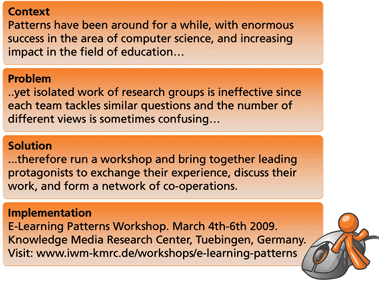
Home
| Call for Abstracts | Registration
| Program Patterns
for social practices: A psychological perspective
Katrin Wodzicki, Knowledge Media Research Center, Tuebingen
Johannes Moskaliuk, University of Tuebingen
Ulrike Cress, Knowledge Media Research Center, Tuebingen
In the past decades,
a collection of widely accepted (design) patterns was developed as descriptions
that externalize and document expert’s implicit knowledge in the
domain of software engineering. The idea of using patterns to describe
complex software problems and to offer an analytical framework to solve
these problems seems to be a good way to transfer and discuss social
practices as well. Recently, there were some efforts to use patterns
in the field of e-learning and education.
In this paper, we will point out why patterns can improve social practices
by making implicit knowledge explicit (e.g., about how to give a good
lecture) and by advancing the communication between experts and laypersons.
However, implementing patterns for discussing about social practices
is linked with some challenges: How to identify constraints or forces
that affect the usefulness of a pattern for social practice? How to
take into account different audience of the pattern with different levels
of previous knowledge? How to find appropriate granularity of patterns
and how to make them adaptive to varying demands of the audience? How
to support the application of social practices described in patterns?
These questions are important because patterns are useless as long as
they are not understood and applied to improve social practice.
From a psychological perspective there are some theories that address
similar questions (e.g., theories about problem solving, expert-layperson-communication,
and group decision-making). To enrich the discussion about patterns
for social practices, we will highlight what can be learned from these
psychological approaches. Nevertheless, there remain open questions
about implementing patterns for social practices. Thus, we will close
with three concrete research questions that have to be answered to ensure
the successful use of patterns for social practices.
Back
to program schedule
|

|


